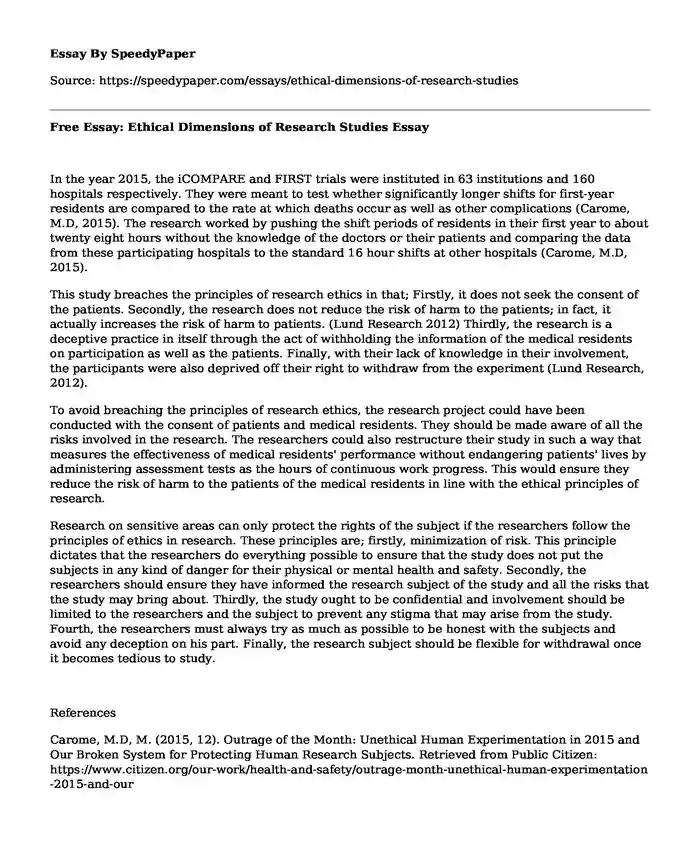In the year 2015, the iCOMPARE and FIRST trials were instituted in 63 institutions and 160 hospitals respectively. They were meant to test whether significantly longer shifts for first-year residents are compared to the rate at which deaths occur as well as other complications (Carome, M.D, 2015). The research worked by pushing the shift periods of residents in their first year to about twenty eight hours without the knowledge of the doctors or their patients and comparing the data from these participating hospitals to the standard 16 hour shifts at other hospitals (Carome, M.D, 2015).
This study breaches the principles of research ethics in that; Firstly, it does not seek the consent of the patients. Secondly, the research does not reduce the risk of harm to the patients; in fact, it actually increases the risk of harm to patients. (Lund Research 2012) Thirdly, the research is a deceptive practice in itself through the act of withholding the information of the medical residents on participation as well as the patients. Finally, with their lack of knowledge in their involvement, the participants were also deprived off their right to withdraw from the experiment (Lund Research, 2012).
To avoid breaching the principles of research ethics, the research project could have been conducted with the consent of patients and medical residents. They should be made aware of all the risks involved in the research. The researchers could also restructure their study in such a way that measures the effectiveness of medical residents' performance without endangering patients' lives by administering assessment tests as the hours of continuous work progress. This would ensure they reduce the risk of harm to the patients of the medical residents in line with the ethical principles of research.
Research on sensitive areas can only protect the rights of the subject if the researchers follow the principles of ethics in research. These principles are; firstly, minimization of risk. This principle dictates that the researchers do everything possible to ensure that the study does not put the subjects in any kind of danger for their physical or mental health and safety. Secondly, the researchers should ensure they have informed the research subject of the study and all the risks that the study may bring about. Thirdly, the study ought to be confidential and involvement should be limited to the researchers and the subject to prevent any stigma that may arise from the study. Fourth, the researchers must always try as much as possible to be honest with the subjects and avoid any deception on his part. Finally, the research subject should be flexible for withdrawal once it becomes tedious to study.
References
Carome, M.D, M. (2015, 12). Outrage of the Month: Unethical Human Experimentation in 2015 and Our Broken System for Protecting Human Research Subjects. Retrieved from Public Citizen: https://www.citizen.org/our-work/health-and-safety/outrage-month-unethical-human-experimentation-2015-and-our
Lund Research. (2012). Principles of Research Ethics. Retrieved from Laerd Dissertation: http://dissertation.laerd.com/principles-of-research-ethics.php
Ware, J. C., Risser, M. R., Manser, T., & Karlson , K. H. (2006). Medical Resident driving simulator performance following a night on call. In J. C. Ware, M. R. Risser, T. Manser, & K. H. Karlson, Behav Sleep Med (pp. 1-12).
Cite this page
Free Essay: Ethical Dimensions of Research Studies. (2022, Apr 08). Retrieved from https://speedypaper.com/essays/ethical-dimensions-of-research-studies
Request Removal
If you are the original author of this essay and no longer wish to have it published on the SpeedyPaper website, please click below to request its removal:
- Essay Example on British Airways Service
- Free Essay on Hospital Discharge Teaching
- Essay Example: Musical Instrumental Preparation
- Civilization vs. Savagery in Lord of the Flies, Literary Essay Example
- The Basics of the U.S. Economy, Free Essay in Economics
- Essay Sample on Lincoln's Duty
- Essay Sample on Indian Groceries: SWOT and PESTEL Analysis
Popular categories





